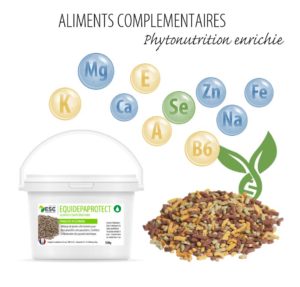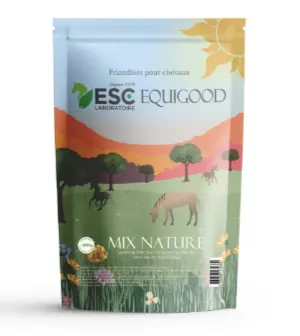The horse's immune system is very complex. It is composed of antibodies, white blood cells and many other substances that help fight infections, allergens and other external threats.
Immunodeficiency diseases in horses are common disorders in many different forms. These deficiencies in the immune system prevent the horse's body from fighting infections, viruses or allergens. As a result, your horse gets sick more often.
Unfortunately, immunodeficiency diseases in horses are very difficult to diagnose. The veterinarian must rely on the symptoms and clinical signs of the horse in the medium term, while also relying on laboratory tests. You must therefore be particularly vigilant and know the potential symptoms of an immunodeficiency in your animal. But also the right actions to boost and effectively prevent your immune system.
Understanding the horse's immune system
The horse's immune system is, as has already been mentioned, made up of several substances to combat potential health risks. It is also composed of several bodies, such as lymph nodes, liver, spleen and thymus.
The bone marrow also contributes to the immune system of horses. When abnormal cells or foreign invaders enter his body, the immune system is responsible for defending and fighting him.
What are the main immunodeficiency diseases in horses?
Immunodeficiency or immune deficiency of the horse refers to a failure of one or more important aspects of its immune system. As a result, your animal is no longer protected against pathogens.
There is several types of immune impairments in horses. Some are much more complex than others, such as severe combined immune deficiency, for which there is still no treatment
Major forms of immunodeficiency include:
- cellular;
- humoral;
- phagocytic;
- additional;
- combined severe.
Immunoglobulin deficiency manifests when the body no longer produces antibodies, or not in sufficient quantities to protect the horse. It can be of two types: primary and secondary.
Primary immune deficiencies are inherited. They are also said to be congenital, indicating that they are present at birth due to genetic dysfunction.
The most common is immunodeficiency associated with the humoral system, which negatively impact antibody production. This type of immunodeficiency can also occur alone or as a combined deficiency. For example, foals who suffer from it risk develop respiratory infections, which will endanger their survival.
Secondary or acquired immunodeficiencies are usually caused by viral, hormonal, nutritional or metabolic disorders. Even if they are not genetic, and therefore present at birth, they usually appear at a very young age as part of a disease that will affect antibody production. Generally, these are tumours such as plasmocyte myeloma or lymphosarcoma.
Failure of passive transfer of immunity
Another cause of immunodeficiency in young horses is Failure of passive transfer immunity. In practice, it is an antibody deficiency in the foal because it does not receive it from its mother via breastfeeding.
This failure may be due to several reasons, in particular in the case of nutrition problems, low levels of antibodies in mare colostrum, or a problem of absorption into the foal digestive tract.
The main symptoms of immunodeficiency in horses
If your horse suffers from immune system disease or immunodeficiency disease, it will have a variety of symptoms. They differ according to the type of immune deficiency he suffers.
The main symptoms of immunodeficiency are: :
- The recurrence of diseases such as pneumonia, meningitis or pyodermitis;
- Infections several times a year and in several areas of the body;
- Abscesses of organs;
- Difficulties growing or gaining weight;
- Loseomyelitis.
Horses with immune deficiencies are also more prone to gastrointestinal disorders. They may also suffer from hormonal imbalances. In addition, the proliferation of free radicals sometimes results in a fragility of their membranes, tissues and muscles.
All these symptoms are visible signs of the deterioration of your horse's health. This is why it is particularly important to detect them as soon as possible and to strengthen your animal's immune system upstream.
Causes of immunodeficiency diseases in horses
The causes of immunodeficiency diseases in horses also depend on the type of deficiency. They may be congenital or due to antibody deficiency, as mentioned above. But the problem can also come from poor cell development, or from a deficiency in serum supplementation.
It is also important to interest in horse allergies. As in humans, allergy is an abnormal and excessive immune response to an environmental antigen that is also called « allergen ».
Allergic reactions occur in the skin, digestive tract, eyes and especially the lungs of the horse. They cause the appearance of certain diseases such as allergic enteritis or the summer dermatitis.
Diet can also cause an immune deficiency in the horse. This may be a deficiency in intake due to an unbalanced diet (in quality or quantity). For example, if you don't give your animal enough protein, it can penalize its antibody production.
Immunodeficiency disease may also be the fact of an assimilation problem during digestion. Finally, the deficit in need often appears in race horses. Their needs are higher because of intense physical activity.
Stress may eventually be the cause of various respiratory tract infections. When it is chronic, it weakens the body of horses, and reduces the ability of their immune system to defend against aggression.
Diagnosis of immunodeficiency diseases in horses
If your horse has any of the symptoms we have just mentioned or tends to be often ill (and encounters difficulties in recovering), Make an appointment with your veterinarian.
It will perform a complete physical examination and evaluate the symptoms of your horse. He will also ask you questions about your horse's medical history and its environment, diet and physical activity.
Immunodeficiency diseases are difficult to diagnose and the veterinarian will perform a variety of tests before reaching a diagnosis. Laboratory tests may include complete blood count, biochemical profile, and urine analysis.
The veterinarian may also suggest genetic testing for congenital disorders. Combining the results with the symptoms of your horse will help draw a conclusion.
How to treat the horse's immune deficiencies?
Several solutions exist to restore your horse's immune defenses:
- Therapeutic treatment, especially to treat infections and viruses as quickly as possible.
- Food supplements. It's an excellent way to strengthen the immune system of his horse. For example, you can enrich his diet with Eleutherococcus or pollen.
- Serum and plasma boosters. These injections of immunoglobulins can help strengthen the immunity of your horse;
- Antibiotic therapy (usually a combination of penicillin and a particular aminoglycoside). It can be recommended based on your animal's immune disorder.
Strengthen your horse's immune defenses through our 100% natural supplements.









